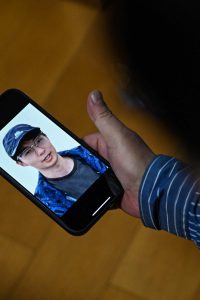
Like many other grief-stricken people, bereaved parents Seakoo Wu and his wife have joined the growing horde of Chinese people using artificial intelligence to create avatars of their lost ones. Wu’s ultimate goal is to create a realistic replica of his dead son that only exists in virtual reality.
‘Once we synchronize reality and the metaverse, I’ll have my son with me again,’ said Wu. ‘I can train him… so that when he sees me, he knows I’m his father.’
Several Chinese firms have allegedly created ‘digital people’ from as little as 30 seconds of audiovisual material of the deceased people. Experts are of the opinion that they can provide comfort to devastated family members and friends. However, they also bring to mind a troubling theme from sci-fi series Black Mirror where people rely on AI for support after the death of their loved ones.
Xuanmo, Wu’s son, died last year at the young age of 22 as a student at the Exeter University in Britain. An accounting and finance major, posthumous organ donor, and sportsman, Xuanmo ‘had such a rich and varied life’, Wu said. ‘He always carried in him this desire to help people and a sense of right and wrong,’ he added.
Following the widespread popularity of technology like ChatGPT, Wu began researching for ways to technologically resurrect his son. Using photos, videos, and audio recordings, he spent thousands of dollars on AI firms to clone Xuanmo’s face and voice.
Although the results are still in the rudimentary stage, he set up a team to develop a database with a large amount of information on his son with the hope of feeding them into powerful algorithms to create a lifelike avatar in his son’s image.
Recently, companies specializing in ‘ghost bots’ have emerged in the United States, but the industry is more common in China, according to Zhang Zewei, former collaborator of Wu and founder of AI firm Super Brain.
‘On AI technology, China is in the highest class worldwide,’ said Zhang. ‘And there are so many people in China, many with emotional needs, which gives us an advantage when it comes to market demand.’
Sima Huapeng, founder of Nanjing-based Silicon Intelligence, stated that the technology would ‘bring about a new kind of humanism’. He said it was similar to photography and portraiture which people use to commemorate the dead.
Tal Morse, visiting research fellow at Britain’s University of Bath, agreed that ghost bots may offer comfort but cautioned that more research was required to understand the ethical and psychological implications.
‘A key question here is… how “loyal” are the ghost bots to the personality they were designed to mimic,’ said Morse. ‘What happens if they do things that will “contaminate” the memory of the person they are supposed to represent?’
According to experts, another quandary is the inability of the dead to give consent. Although permission is not necessarily required to mimic behavior or speech, it might be required to ‘do certain other things with that simulacrum’ said Nate Sharadin, a philosopher at the University of Hong Kong specializing in artificial intelligence and its social effects.
For Zhang, all new technology is ‘a double-edged sword’. ‘As long as we’re helping those who need it, I see no problem.’
He stated that he does not work with those for whom the technology could have a negative impact, citing the example of a woman who attempted suicide after the death of her daughter.
Wu stated that Xuanmo would ‘probably would have been willing’ to be digitally revived.
‘One day, son, we will all reunite in the metaverse. The technology is getting better every day… it’s just a matter of time,’ Wu said at his son’s grave.
By Marvellous Iwendi
Source: YP